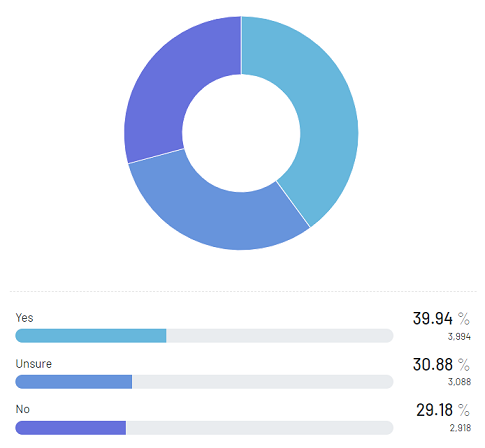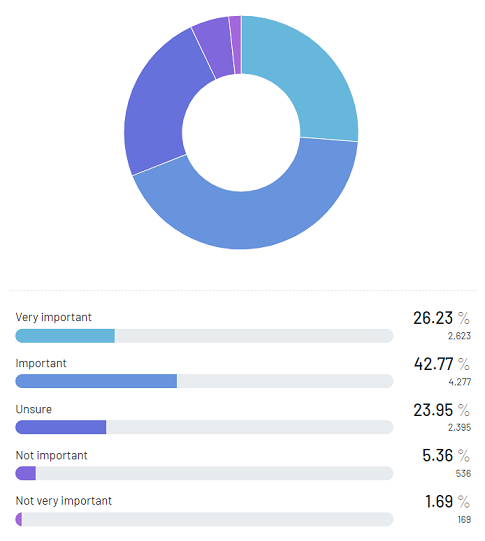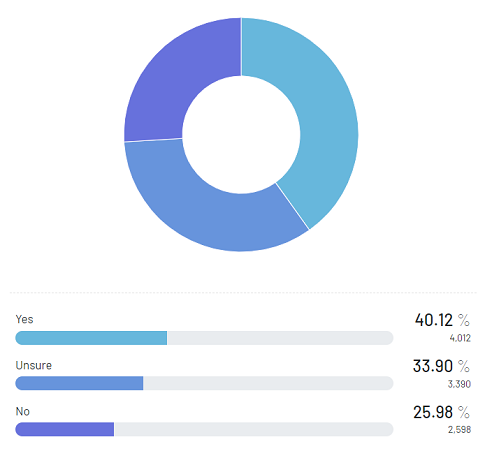 40.12% Believe Somalia’s Social Media Ban Will Effectively Limit the Spread of Indecent Content
40.12% Believe Somalia’s Social Media Ban Will Effectively Limit the Spread of Indecent ContentSince social media has been introduced to the world, the platforms have improved a lot, and nowadays we depend on social media a lot for communicating with friends, staying in touch with family, and knowing more about the different cultures around the world.
However, social media is a double-edged sword. Many people use the platforms for malicious reasons such as bullying, hacking, sharing harmful content, and much more. Social media isn’t perfect, but to decrease the risks, should we just ban it? That’s what Somalia did.
In August 2023, Somalia’s Minister of Communications and Technology ordered the country’s internet service providers to turn off access to two social media platforms, TikTok and Telegram, and one gambling site called 1XBet.
The statement mentioned security and fighting terrorism as reasons for blocking the companies, as many terror groups use social media sites to communicate and reach out to people.
Somalia’s social media crackdown didn’t resonate with many people, while some agreed with the ministry. To understand what people actually feel about this decision, Real Research, an online survey app, published a survey on the matter, and here are the results.
Highlights:
- According to 39.94%, the reasons why Somalia’s social media platforms were banned were justified.
- 38.79% believe that Somalia’s social media crackdown will likely impact the online behavior and communication habits of Somalis.
- 38.56% were neutral about a similar ban on social media platforms in their own countries if the government stated similar reasons.
Somalia’s Social Media Crackdown
Somalia’s Ministry of Communication and Technology is banning TikTok, Telegram, and 1XBit from the country by ordering the country’s internet service providers to turn them off. In our survey on Somalia’s social media crackdown, 41.13% were aware of it, 32.99% were vaguely aware, and 25.88% didn’t know of the news.
Somalia’s ban on social media platforms was due to terrorism and immoral groups, according to the communications minister. The minister has directed internet companies to cease allowing access to the aforementioned platforms as terrorists and immoral groups use them to spread disturbing images and misinformation. This ban was appropriate according to 39.94%, while 30.88% weren’t sure if the ban was appropriate and 29.18% thought it wasn’t.

Importance of Social Media Platforms
A lot of people use social media to connect with others and to know what’s happening around the world. Around 38.79% believe that Somalia’s social media crackdown would likely impact the online behavior and communication habits of Somalis. 32.38% weren’t sure of the impact, 22.3% thought the ban would highly likely impact the behavior, 5.29% thought it was unlikely, and a minority of 1.24% thought it was highly unlikely.
As we mentioned earlier, social media platforms are used for many reasons; TikTok and Telegram specifically are important for communication and entertainment purposes, according to 42.77%. More than one in four (26.23%) saw the platforms as very important, while 23.95% weren’t sure of their importance. A minor 5.36% didn’t see the platforms as important for communication and entertainment purposes, and 1.69% didn’t think they were very important.

Is the Ban Effective?
The minister stated that the ban on TikTok, Telegram, and 1XBet in Somalia would effectively limit the spread of indecent content and propaganda, a statement that 40.12% shared with him. While 33.95% weren’t sure of its effectiveness and 25.98% didn’t believe it limited the spread of indecent content.

Even if the ban on TikTok, Telegram, and 1XBet in Somalia limited the spread of indecent content, almost half (45.13%) said that propaganda and indecent content would continue to spread through other social media platforms and online channels. 31.05% thought the opposite, and 23.82% didn’t have an opinion on the matter.
People were mostly neutral (38.56%) about a similar ban on social media platforms in their own countries if the government stated similar reasons. 33.52% opposed a similar ban, and 27.92% supported it.
Methodology | |
| Survey Title | Survey on Somalia’s Social Media Crackdown |
| Duration | August 23 – August 30, 2023 |
| Number of Participants | 10,000 |
| Demographics | Males and females, aged 21 to 99 |
| Participating Countries | Afghanistan, Algeria, Angola, Argentina, Armenia, Australia, Azerbaijan, Bahrain, Bangladesh, Belarus, Benin, Bolivia,… Brazil, Brunei, Bulgaria, Burkina Faso, Cambodia, Cameroon, Canada, Chile, China, China (Hong Kong) China (Macao), China (Taiwan), Colombia, Costa Rica, Croatia, Czech Republic, Ecuador, Egypt, El Salvador, Ethiopia, Finland, France, Gambia, Georgia, Germany, Ghana, Greece, Greanada, Guatemala, Honduras, Hungary, India, Indonesia, Iraq, Ireland, Israel, Italy, Ivory Coast, Japan, Jordan, Kenya, Kuwait, Kyrgyzstan, Latvia, Lebanon, Libya, Lithuania, Malaysia, Maldives, Maluritania, Mexico, Moldova, Mongolia, Morocco, Mozambique, Myanmar [Burma], Namibia, Nepal, Nicaragua, Nigeria, Oman, Pakistan, Palestine, Panama, Peru, Philippines, Poland, Portugal, Qatar, Romania, Russia, Saudi Arabia, Serbia, Sierra Leone, Singapore, Slovakia, South Africa, South Korea, Spain, Sri Lanka, Tanzania, Thailand, Togo, Tunisia, Turkey, Turkmenistan, Uganda, Ukraine, United Arab Emirates, United Kingdom, United States, Uruguay, Uzbekistan, Venezuela, Vietnam, Yemen, Zimbabwe. |
RR Author
Real Research News is the media platform that presents insights and studies of wide-range of topics. It focuses on insights gathered from its survey app.







